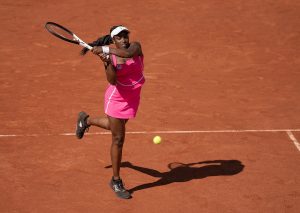Eight-time champion Roger Federer narrowly escaped a close battle with Frenchman Adrian Mannarino in four sets in his first Wimbledon match. Manarinno’s misfortune ended the match when he slipped in the sixth game of the fourth set, forcing him to withdraw a few games later. Federer’s performance in his opening match was not close to his usual performances at SW19. The Swiss is known for having very few unforced errors in his game. However, this match he hit more unforced errors than winners. Federer’s forehand and serve appeared to be inconsistent at times, resulting in an increase in unforced errors overall.
Analysis
A lot of factors have to do with the speed of the surface. It was also quite unusual to see Federer struggle to position himself on his shots. Mistiming caused him to be on defense often during the points. After the first set, it looked as if Federer was becoming too passive on his shots, constantly trying to elongate the rally. Since Federer’s default style of play is offensive, increased defense on a fast surface isn’t the best strategy. Also, it appeared as if Federer was baffled by Mannarino’s game plan, which involves converting the opponent’s power into pace with sharp angles across the court. Typically Federer would have a clear idea of the opponent’s strategy and counteract whenever possible.
After losing the second set, Federer clearly changed his tactics for the match. Federer really started to play more aggressively, particularly on the forehand side trying to dominate the points. But since his footwork wasn’t up to par, the 39-year-old’s shots weren’t very effective. Since Federer was trying to hit harder off both wings, he was positioning himself a little too close to the baseline, which would make it easier to come to the net and put away the point with a volley. The strategy appeared to work in some instances, but Mannarino’s short backswing and counter punching style returned the balls faster than Federer could anticipate, resulting in errors or weak shots.
Key Factors and Points
This brings us to the most important factor or flaw in Federer’s game right now: his mental strength. Federer is known for being one of the most composed and calm players on the court. He has the ability to change and improvise his game style and tactics depending on the opponent and match situation, allowing him to produce unimaginable winners and shots in crucial moments. Unfortunately, in Federer’s matches leading up to Wimbledon he lacked mental strength and sharpness on the court. If Federer loses a set or a crucial game, he becomes visibly nervous and tense, which causes his serve to become compromised.
Another major issue is that Federer appears to be overly concerned with the construction and execution of points. In contrast to previous years, when he would breeze through rallies and improvise effortlessly. Federer is nearly 40 years old, and the pressure is very high on him at Wimbledon. It’s possible that Federer is over-focusing on that, which is preventing him from playing naturally and carefree.
Improvements and Thoughts
How can Federer improve for the next match? To begin, he’ll need rest and some light practice to be ready for his next opponent. The next step would be to be more aggressive from the start, putting his opponent on the back foot and forcing him to defend constantly. Mixing up his play style with slices and low fast balls can set up quicker points. The consistency of his serve and forehand would come next. If he does so, he can put more pressure on his opponent, relieving some of the stress without putting himself in danger. Federer’s goal for his next match–against another Frenchman and veteran, Richard Gasquet–should be to win in straight sets. This would greatly boost his confidence and morale going into future matches against more difficult opponents.
Finally, Federer should concentrate on playing a good match, allowing his experience and talent to lead the way. We saw a similar version of Federer in 2017. He was very relaxed on court, and it led to one of his most successful recent years on tour. If Roger Federer can mentally relax, he has a good chance of winning the Wimbledon trophy for the ninth time.
Main Photo from Getty.






